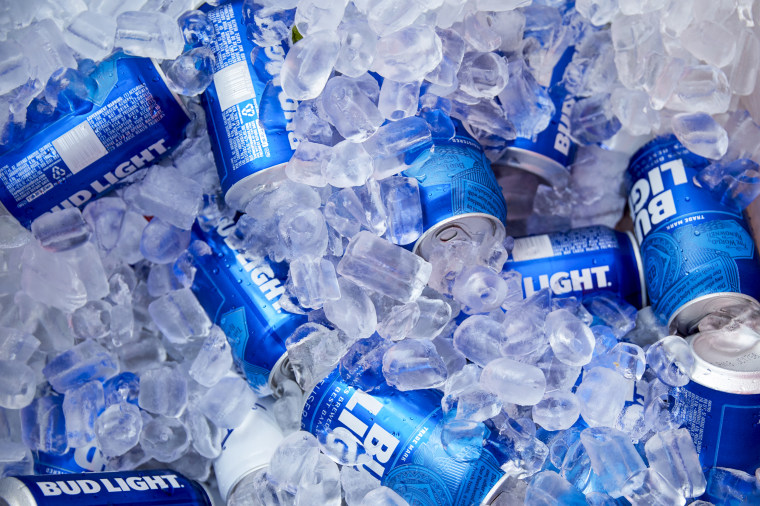Every June it seems, corporations throughout the Western world change their social media logos to something rainbow-colored to mark the start of LGBTQ Pride Month. These companies sometimes release special LGBTQ-branded products or sponsor floats in local pride parades. These ads targeting queer consumers have grown increasingly popular within the last decade, but even before then, alcohol companies, in particular, recognized the market potential of the LGBTQ community.
The company’s response to the conservative backlash suggests that its campaign didn’t come with any real commitment to inclusion.
Though it didn’t come in June, Bud Light recently made a play for queer consumers when it produced a single can of the brand’s beer featuring trans TikTok influencer Dylan Mulvaney’s likeness. On April 1, Mulvaney made an Instagram post promoting Bud Light to her nearly 2 million followers. But the company’s response to the conservative backlash that followed suggests that its campaign didn’t come with any real commitment to inclusion. The Associated Press reported Saturday citing media reports that Alissa Heinerscheid, Bud Light’s vice president of marketing, who oversaw the partnership with Mulvaney, will be replaced and is taking a leave of absence. The Wall Street Journal reported Sunday that Daniel Blake, an Anheuser-Bush marketing executive, also took a leave of absence.
The sort of social media promotion campaign that Bud Light did with Mulvaney is ubiquitous in today’s influencer-driven social media world. However, to conservatives, the partnership between a beloved cheap beer brand and a rising trans influencer was too much to take. Former-rocker-turned-conservative-celebrity Kid Rock posted a video of himself shooting up cases of the brand’s beer with a gun, and countless videos of conservatives smashing cases or cans of Bud Light and other Anheuser-Busch products went viral.
After what's been reported as a significant dip in sales, the company tucked tail and sought to distance itself from Mulvaney. Anheuser-Busch CEO Brendan Whitworth released a mealy-mouthed non-apology that said, “We never intended to be part of a discussion that divides people,” as conservative media dragged Heinerscheid through the mud. Then came the news that Heinerscheid will be replaced.
Before jumping into such campaigns that feature queer people or are aimed at queer consumers, company executives need to ask themselves how committed they are. If a conservative boycott is enough to quickly scare them off, it’d be better if they skip the campaign altogether.
The Bud Light/Mulvaney controversy was the latest illustration of the right’s long and increasingly obsessive and weird fixation with transgender people. Consumers of conservative commentary have been conditioned into needing ever more trans-related outrage to feed their obsession, and Mulvaney’s beer campaign hit the sweet spot.
Mulvaney is popular with young folks, which many conservatives wish they were. She’s also a touch bit cringe in the way that social media influencers often are. On top of that, she’s trans and has been celebrated in several media forums. It was the perfect mix for the conservative brand of rage that keeps regular folks distracted with meaningless cultural markers and signifiers instead of seeking material change from those in charge.
It’s easy to understand why alcoholic beverage companies see the queer community as such a lucrative market. Gay couples are more likely to be childless and more likely to spend time at a bar than straight couples. As a demographic, gays, lesbians and bisexuals have been reported to be "more likely to engage in casual, binge, and heavy alcohol use than their heterosexual counterparts." That has meant more dollars from those communities for beer and liquor companies. But the Bud Light controversy illustrates the emptiness of these rainbow-washing ad campaigns and how often they amount to mere pandering for gay dollars from corporations whose only real commitment is to profit.
The Bud Light controversy illustrates the emptiness of these rainbow-washing ad campaigns and how often they amount to mere pandering.
With the emergence of trans issues and the resulting conservative obsession with tamping down everything trans in society, companies need to take more careful measure of their outward LGBTQ support. It’s easy to see a boycott such as this anytime a company does something to celebrate or bring light to a trans person.
But bending to the pressure isn’t the only option. Just a few weeks ago, Canadian trans activist Fae Johnstone was pilloried in the right-wing press after Hershey’s Canada featured her as part of its International Women’s Day campaign. Unlike Bud Light, however, Hershey stood by its campaign. The company defended its decision and backed up Johnstone as she faced down conservative hate.
That’s the way it should be done. If a company is going to appeal to trans people, it should be prepared to defend its decision. Now is not the time for empty corporate gestures toward trans people. We don’t need any more fake allies.

